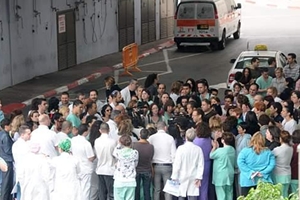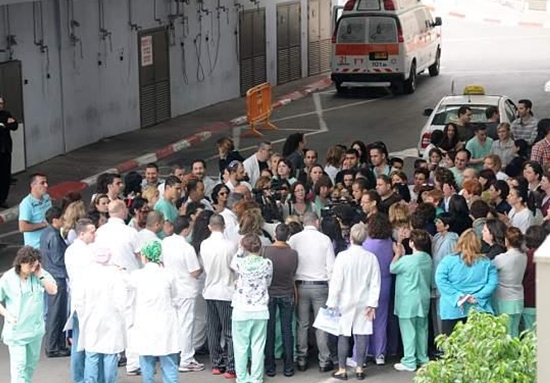
Workers at the Haifa, Ashdod and Eilat ports held a one-day strike over pension-related demands Sunday, but will be back at work Monday after a truce was reached at a late-night National Labor Court meeting. The strike began following the breakdown of negotiations between port worker representatives, the Histadrut labor federation and the Treasury.
The workers were demanding that their pension funds be secured by moving them out of accounts managed by the port companies and into trust accounts. Court President Nili Arad convened representatives from the Histadrut, the Treasury, the Manufacturers Association and the Haifa Ports Company at her chambers late Sunday night, after the latter two filed urgent requests for injunctions to halt the strikes. At the end of the meeting she ordered the sides to conduct two weeks of negotiations under her supervision. The Treasury committed to not using workers’ pension funds for any alternative purpose.

Nurses protests, Sourasky Medical Center, Tel-Aviv (Photo: Al-Ittihad)
The Manufacturers Association and the Haifa Port Company told the court in their written submissions earlier in the day that the call to strike was illegal, and asked it to order workers to return to their duties immediately. The two organizations also requested that the court order the state to commence “intensive and urgent negotiations to find a solution to the crisis” and asked the court to organize mediation between the parties after it issued injunctions
Nurses across Israel went on a 24-hour strike on Monday morning, after overnight negotiations between the Finance Ministry and the chairman of the national nurses union failed to reach an agreement to prevent the strike. Negotiations between the parties started on Sunday afternoon, and continued until 4 A.M. on Monday morning, when the talks reached an impasse.
The two sides reached an understanding that the severe shortage of nurses in Israel’s health system is a matter of national priority that requires exceptional steps. In return, however, the treasury demanded that nurses agree to hospitalization of patients even when hospitals reach occupancy levels of 150 percent, and that they agree to maintain industrial peace.
The chairperson of the national nurses union, Ilana Cohen, made it clear that no consensus could be reached without a solution for patients lying in hospital corridors, saying that corridor medicine endangers the lives of patients. “There is an agreement from the Treasury to make nursing an attractive profession, but nothing has been put in writing yet,” Cohen said, adding that the nurses have demanded additional beds to deal with the high rate of patient intake at hospitals.
“They want me to allow 80 people in wards and to commit to no-strike period of years,” she said. “The wards look like parking lots of beds, children are hospitalized one on top of the other, beds are in corridors and next to the toilet. It makes no sense and I will not let patients continue to get this kind of treatment. Patients are not numbers,” she said.
The nurses’ struggle began a year ago, after the nursing teams collapsed under the pressure caused by high occupancy of hospital wards across the country. After nurses resorted to organizational measures, it was agreed that occupancy in internal medicine wards would be reduced immediately to 120 percent, and this year it will be reduced again to 115 percent.
In addition, nursing teams in internal medicine wards were increased, but in recent weeks, wards reached occupancy levels of 140 percent and nursing staff have again collapsed under the strain. Last week, nurses from hospitals in southern Israel abandoned their wards to protests the situation.
Nursing staff from Clalit Health Services community clinics, health offices, baby care clinics, schools and public hospitals across the country are participating in the strike. Student nurses will also strike, and overseas immunization clinics will be closed.
So far, 2012 has seen a growing number of strikes and labor struggles. Earlier this month, the Israel Railways union announced a strike against privatization, freezing the country’s national train service only one day after four days-long nationwide general strike.
Related:


